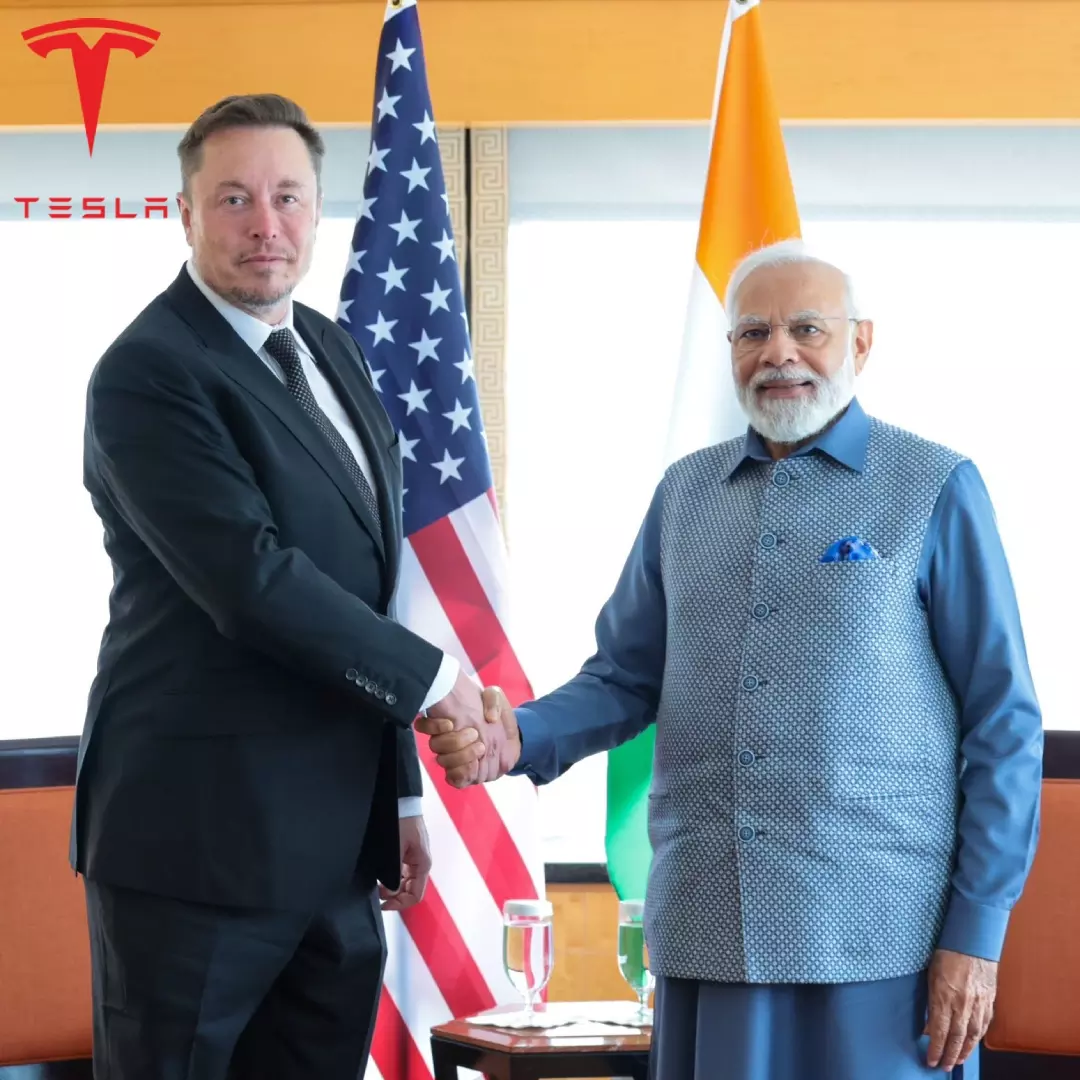
Image Credits: Twitter
Tesla In Talks With Govt To Set Up Factory In India
Writer: Ankita Singh
A literature lover who likes delving deeper into a wide range of societal issues and expresses her opinions about the same. Keeps looking for best-read recommendations while enjoying her coffee and tea.
Others/World, 13 July 2023 8:50 AM GMT
Editor : Al Arafat Sherfuddeen |
Passionate writer about current events, politics and happenings nationally and globally. An agent of communal harmony and an ardent Arsenal fan.
Creatives : Ankita Singh
A literature lover who likes delving deeper into a wide range of societal issues and expresses her opinions about the same. Keeps looking for best-read recommendations while enjoying her coffee and tea.
Tesla has initiated discussions with the Indian government regarding a proposed investment to establish a car factory in the country, as per a report published on Thursday.
Tesla has initiated discussions with the Indian government regarding a proposed investment to establish a car factory in the country., as per a report published on Thursday. The factory would have an annual production capacity of up to 500,000 electric vehicles, with prices for these vehicles starting at ₹ 20 lakh.
The report further mentions that Tesla is considering India as an export hub to cater to countries in the Indo-Pacific region, as per government sources.
During a meeting with Elon Musk, the billionaire CEO of Tesla, last month, Indian Prime Minister Narendra Modi encouraged the automaker to make a "significant investment" in India, reported India Today.
In June, after meeting with PM Modi in New York, Musk expressed his intention for Tesla to invest in India at the earliest opportunity. He stated, "I am confident that Tesla will be in India and will do so as soon as humanly possible," adding that he planned to visit the country next year. Musk also mentioned the possibility of bringing Tesla's Starlink satellite Internet service to India.
In May, Tesla executives visited India and engaged in discussions with Indian bureaucrats and ministers regarding the establishment of manufacturing facilities for cars and batteries in the country.
India's Domestic EV Market
According to the Economic Survey 2023, India's domestic electric vehicle market is expected to experience a remarkable compound annual growth rate (CAGR) of 49 percent between 2022 and 2030. The survey predicts that by 2030, the country will achieve an annual sales volume of 10 million electric vehicles. This growth trajectory is anticipated to have a significant impact on the job market, with the electric vehicle industry estimated to generate approximately 50 million direct and indirect employment opportunities by 2030.
To facilitate the expansion of the electric vehicle sector, the Indian government has set a target to achieve 30 percent electrification of the nation's vehicle fleet by 2030. In line with this objective, the government has introduced various incentives and policies aimed at promoting the growth of the electric vehicle industry.
The FY24 Union Budget allocated substantial resources to support the production of electric vehicles, promote the adoption of hydrogen fuel, and embrace emerging technologies. These measures reflect the government's commitment to creating an enabling environment for the development and adoption of electric vehicles in the country, as per a report in Invest India.
Announcements In Union Budget
The Union Budget 2023 has removed custom duty on capital goods/machinery for manufacture of lithium-ion cells for use in batteries of electrically operated vehicles (EVs). The move is said to help in reducing the cost of EVs in the country, reported Livemint.
"To further provide impetus to green mobility, customs duty exemption is being extended to import of capital goods and machinery required for manufacture of lithium-ion cells for batteries used in electric vehicles," Finance Minister Nirmala Sitharaman said in her speech while announcing the budget .
In the 2023-24 Union Budget, Finance Minister Nirmala Sitharaman made significant announcements to promote India's energy transition and achieve net-zero targets by 2070. The budget allocated ₹35,000 crore for crucial capital investments in this direction. To support Battery Energy Storage Systems, the government will provide viability gap funding for a capacity of 4,000 MWH. Initiatives such as the Faster Adoption of Manufacturing of Electric Vehicles Scheme – II (FAME – II) and the Production Linked Incentive Scheme (PLI) have already been launched to support electric vehicle manufacturers.
Indian automobile manufacturers like Tata Motors and Mahindra & Mahindra have started producing electric vehicles, while international companies are also entering the market. Swedish luxury carmaker Volvo Cars is considering setting up an electric vehicle manufacturing facility, with India being a potential contender. The charging infrastructure is being expanded with investments from both the government and private companies, resulting in the establishment of more charging stations.
The introduction of the nation's first EV charging plaza by EESL in July 2020 marked the beginning of an accelerated growth in charging infrastructure. Within a year, the number of charging stations has increased more than fivefold. The success of the Delhi EV Policy, launched in 2020, is evident in the increasing popularity of electric vehicles in the capital. In December 2022, electric vehicles accounted for 16.8 percent of all vehicle sales in Delhi, indicating a year-on-year growth of 86 percent. The stage is set for significant growth in India's electric vehicle market in the coming years.
 All section
All section














